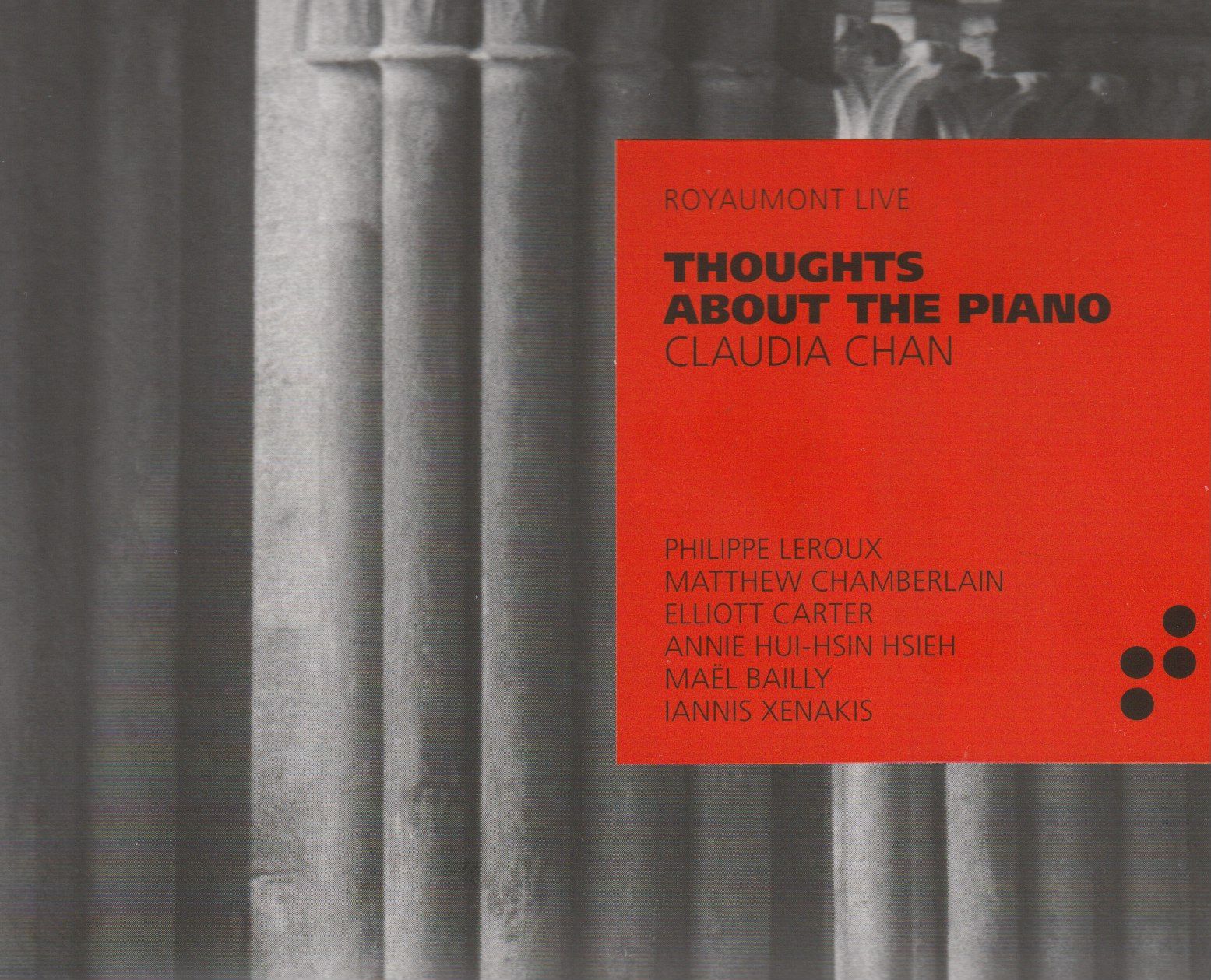Thoughts about the Piano: Claudia Chan's fascinating programme
Buy this disc for Chan's performance of Xenakis' Evryali alone, then go on to peel away the other discoveries ....

More from B Records here, the label associated with the Orléans Piano Compsetition (which was in fact my introduction to the company). This particular disc is linked to Royaumont Live and presents the Chinese-Canadian, Cologne-based panist Claudia Chan.
Chan was Artist-in-Residence of the contemporary music department of Fondation Royaumont from 2017. The disc was recorded live, whic, as Chan explains in this interview, added an extra layer to the experience:
We begin with Philippe Leroux‘s AMA:
Texturally quixotic, the piece is a kaleidoscope of piano sounds and techniques. Chan finds beauty as well as contemporary hardness. Composed in 2009 and commissioned by the Marguerite Long-Jacques Thibaud competition, AMA is split into two parts (AMA I and AMA II) and explores piano resonance and ideas of ongoing transformation. The resonances come about through deep understanding ofteh piano as a physical, acoustic instrument; some faster, high passages almost sound electronic as we hear the hammers raining down (stunningly played here). There is a feeling of dissembling and the bringing together of ideas from the opening; challenenges include ‘polyrhythmic terracing’ (justaposing layers of complex rhythms), There is a distant whistling towards the end, which brings the title into play. “Ama” refers to Japanese female pearl fishers who use a special breathing technique to achieve their goals.
The piano is caught perfectly. We literally need to hear every nuance, and B-Records’ soudn allows for that. Chan’s performance itself is rearkable, shot through with character,even dancing at times, perhaps amusing at others, at one pont sounding like a million bells going off at once, often technically fierce.
Chan teases Christopher Chamberlain’s Rejected Ballet Music (2018) into being. Subtitled “Ultimately not approproate for dancing,” Here's what the composer has to say about it (taken from his website):
About the title: It came fairly late in the process of writing the piece, at a delicate time when the piece needed to gather itself around a clear ethos. It doesn’t reflect the idea that started the piece, but rather seeks to extend, bolster, and interact with it, to suggest avenues for listening. (The piece first grew out of software that I developed to generate chord progressions by algorithmically finding paths through vast networks of related harmonies, all bounded by an understanding of the hands’ ability to play only a particular body of chords on the piano. But those technical aspects do not define the piece’s character and I don’t care to make them the center of attention.)
I like to imagine this piece as a kind of undanceable dance (a bit of therapy), something too personal to succeed because it never was actually meant to be shared. Perhaps it was begun with the intention of actually supporting dance but, at some point, it was consumed by an incommunicably personal problem. That’s why this ballet music was rejected but, beyond that, its rejection casts the piece in a more private light: There’s intimacy in our experience of finally hearing it — like reading an article rejected from a magazine or a never-published book. Just like us, it is imperfect and vulnerable; so, in sympathizing with it, we have an opportunity a little bit better to love and accept ourselves.
The key points are the intimacy of the experience; and interestingly, how when the music finally crescendos, it implies (to this listener at least) emotional pain:
Can is superb here in understanding Chamberlain’s mode of discourse, from softened Schoenbergian dyads to, perhaps Cardew. The piece was a commission from Royaumont from 2018 for Claudia Chan.
Elliott Carter is of course well-known. His Two Thoughts About The Piano of 2011 comprises “Intermittences” and “Caténaires”. Stephen Beck has made a fine recording on Bridge Records (an all-Carter disc), but I prefer Chan’s impeccable musicianship here. Here‘s the first:
Chan’s virtuosity is simply scintillating in the second Carter piece, her fingerwork so even. Having mentioned Beck, I do find the honours tied between Chan and Pina Napoletano on Odradek on the disc Tempo e Tempi, which mixes works by Carter and Beethoven (teh Piano Sonatas Nos. 31 and 32).
A piece of sublime tranquility, Annie Hui-Hsin Hsieh’s Radius was written at Royaumant Noix academy in 2017 for Chan. For this listener it acts as an invitation into more of Hsieh’s music; it exudes beauty, even when asking the pianist tomake scratchings and so on. The score of Radius is available here, and here is the piece itself:
Penultimately, we have Maël Mailly’s or not prepared (2005), bright, almost Minimalist at its opening before taking that repeated gesture and eamining it, deconstructing it. A single note (G) holds the first movement together while the second orbits around a cluster:
In a masterpiece of programming, Bailly’s piece leads impeccably into Xanakis’ 1973 piece Evryali. It says a lot about thsi programme to say that this is probably the best known piece (some might argue for Carter). After having re-fallen in love with the music of Xenakis via the Révolutions Xenakis exhibition at the Philharmonie, Cité de la Musique, Paris, recently, it is wonderful to hear thsi piece played with real clarity yet excitement. Inevitably the name of Claude Halffter crops up in discussion with this piece (I remember a performance by that pianist at London’s Wigmore Hall of Xenakis’ Mists being a real turning point for me), but Chan has her own way. Her clear priority of clarity and excitement in equal measure, plus a desire to find beauty, is revelatory. Buy this disc for this performance alone, then go on to peel away the other discoveries:
